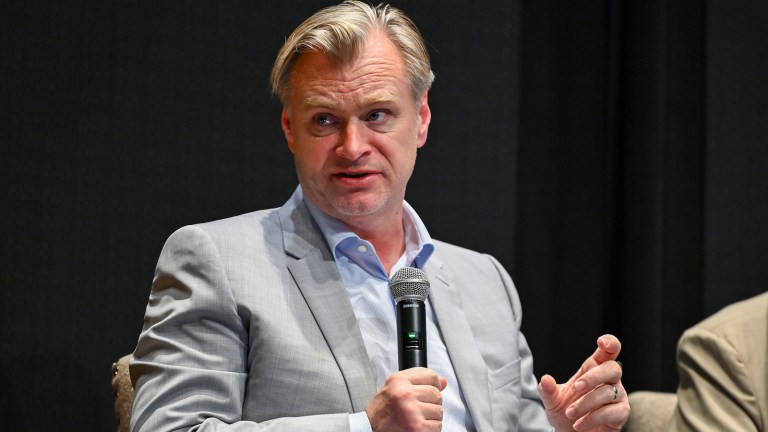Christopher Nolan: We Are Living in an ‘Oppenheimer Moment’ Thanks to AI Development
Filmmaker Christopher Nolan notes how the story of J. Robert Oppenheimer could be seen as a cautionary tale for those embracing (or exploiting) the potential of artificial intelligence right now.

Writer, director, and filmmaker Christopher Nolan has been reassured by researchers working in the development of artificial intelligence (A.I.) that they recognize parallels between their work and when J. Robert Oppenheimer “fathered” the atomic bomb in Los Alamos, New Mexico in 1945. The filmmaker takes this modicum of self-awareness as a hopeful sign, but it is not necessarily a comforting one for those who know the Oppenheimer story—including Christopher Nolan.
The director seemed to suggest as much during a panel in New York City that commemorated the 78th anniversary of the Trinity test in New Mexico—the first time a nuclear bomb was successfully detonated. After the test, Oppenheimer famously quoted the Bhagavad Gita when he reflected, “Now I am become Death, the destroyer of worlds.”
That legacy and so much more was carefully discussed, and perhaps lightly debated, during the Trinity anniversary panel, where Den of Geek was in attendance. The conversation was moderated by MSNBC’s Chuck Todd and also featured Kai Bird, co-author of American Prometheus: The Triumph and Tragedy of J. Robert Oppenheimer, Nobel Prize-winning theoretical physicist Kip Thorne, Tom Mason, the director of the Los Alamos National Laboratory (Oppenheimer’s old job), and Italian physicist Carlo Rovelli. And during the discussion, Nolan considered the still disturbingly relevant implications of Oppenheimer’s story.
The idea of making a movie about the father of the atomic bomb partially came to Nolan out of the fact that his children seemed to not recognize the imminent danger still inherent in nuclear weapons during the 2010s (thus before the current anxiety over Russia’s invasion of Ukraine). Yet it isn’t just the threat of nuclear weapons that seems to linger in the filmmaker’s mind.
“When I talk to the leading researchers in the field of A.I. right now, they literally refer to this as their ‘Oppenheimer moment,’” Nolan told the audience. “Looking to his story to say, ‘Okay what are the responsibilities for scientists developing new technologies that may have unintended consequences?’”
When Nolan was pressed by Todd on whether he thinks folks in Silicon Valley are genuinely discussing the lessons of Oppenheimer, the director added, “I mean, they say that they do,” before failing to suppress a chuckle that more than a few folks in the room shared. “That’s helpful in that at least it’s in the conversation.”
Indeed, Oppenheimer himself was painfully aware of the possible implications of his work. Like one of his mentors, Danish physicist Niels Bohr, Oppenheimer hoped the development of a nuclear weapon would be so terrible that it might end (or limit) all types of warfare afterward. Yet a key to this goal was developing a post-war system of international cooperation where all nations could monitor one another’s nuclear research and banned the development of atomic weapons.
Instead the Second World War gave way to a Cold War arms race of stockpiling nuclear armaments, bigger “super-bombs,” and a modern surplus of weapons of mass destruction where the U.S. alone still holds enough thermonuclear weapons to destroy the world 10 times over. It was Oppenheimer’s political attempts to prevent the U.S. from developing “super” hydrogen bombs in 1949 that made him a political enemy of war hawks who later smeared his name and ran him out of government under suspicions of disloyalty in 1954. Oppenheimer was keenly aware of the dangers of the technology he pioneered (including how it would be used in warfare), yet even in the far more regulated efforts in 1940s Los Alamos, and political placement at that time, he could not prevent the new world he helped shape.
During the Trinity anniversary panel, Nolan pointed out how Oppenheimer’s legacy leaves behind no easy answers, however the filmmaker sees it as a cautionary tale which shows how the scientific community should be prepared to take accountability for their work. So when Todd later steered the discussion back around to Silicon Valley, and what lessons the movie Oppenheimer might have on our current climate, the director returned to the “Oppenheimer moment” of A.I.—including how it is currently affecting the SAG-AFTRA and WGA strikes in Hollywood.
“I think what I would want them to take away is the concept of accountability,” said the filmmaker. “Not to sideline the conversation to the labor disputes going on in Hollywood right now, but when they’re talking about things like A.I. [and] all these issues, they all ultimately boil down to the same thing, which is when you innovate with technology, you have to maintain accountability.”
Nolan noted there’s been a great rise in companies who “bandy about words like ‘algorithm’” in the last 15 years, but none of them have any meaningful understanding, in a mathematical sense, about what an algorithm does. While pointing to the physicists next to him, he added, “These guys all know what an algorithm is and what it does. People in my business talking about it, they just don’t want to take responsibility for whatever that algorithm does.”
He continued, “Applied to A.I. that’s a terrifying possibility. Terrifying. Not least, because as A.I. systems go into the defense infrastructure, ultimately they’ll be in charge of nuclear weapons. And if we allow people to say that is a separate entity from the person who’s wielding, programming, putting that A.I. into use, then we’re doomed. It has to be about accountability. We have to hold people accountable for what they do with the tools that they have.”
Perhaps if someone is in their Oppenheimer moment, they should consider how things ended for both the physicist and the technology he helped pioneer… and not push the button?
Oppenheimer is in theaters on Friday, July 21.
